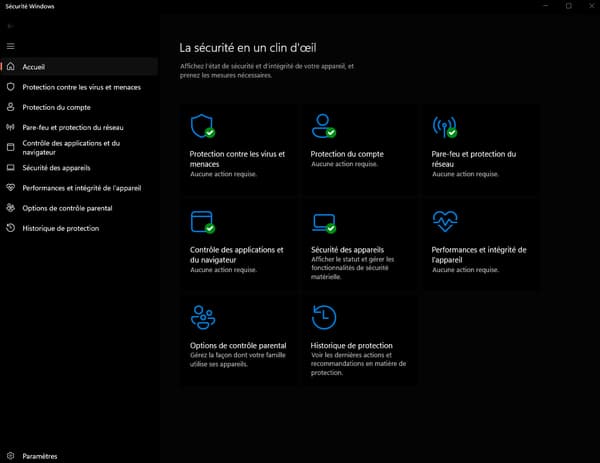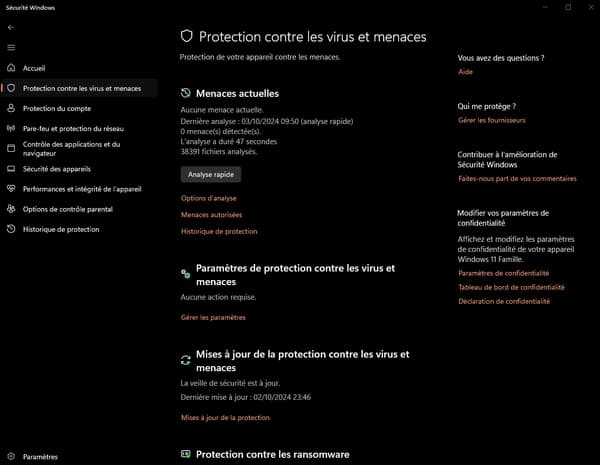If threats become increasingly present on the Internet, the question of the usefulness of antivirus software arises in the face of Microsoft's efforts to improve its tool built directly into Windows.
You may not know it, but Windows has included antivirus software since 2006. Nearly twenty years ago, Microsoft launched Microsoft Defender on Windows XP, which was first introduced as antivirus and anti-spyware software on user actions – For example to recover their login credentials.
Is a free antivirus built into Windows enough?
After being mocked in its early days, Microsoft's antivirus has been extensively overhauled over the years, incorporating the Microsoft Security Essentials suite from Windows 8. Its goal is to monitor your operating system to remove spyware and viruses that can lurk there. For free. Finally, the company added it automatically to the Windows operating system without the user needing to do anything, especially within Edge, the company's browser that replaced Internet Explorer.
It also has additional protections compared to its first version, such as protection against ransomware.

Microsoft Defender is easily accessible from the Start menu and is hidden behind the name “Windows Security”. Most of the time, it works without you having to do anything, as it regularly scans your storage spaces to prevent malware from causing problems. However, you can perform a full scan manually.
But Microsoft Defender isn't the only defense available. Over the years and the increase in threats on the web, browsers themselves have equipped themselves with strong security measures to prevent the user from being scammed. We can therefore rely on a blacklist of sites from Google or Microsoft, but also from Apple, without relying on the generalization of HTTPS, which allows you to take advantage of the so-called “secure” connection.
Is Microsoft Defender, as well as anti-malware software like Malwarebytes and a modern browser, still enough to replace a paid antivirus suite like Norton or Bitdefender? This is a question worth asking at a time when threats target companies collecting data more than users themselves.
in Survey 2021 From the Cybersecurity and Infrastructure Security Agency (CISA), it appears that most current malware seeks above all to recover its victim's data through inattention, for example through an email or SMS pretending to be a service. While antivirus software can tell you that a link is suspicious, it is not infallible.
Threats have changed targets
Contrary to what one might think, Windows' built-in antivirus software can't do everything. To enhance their offerings, today's paid antiviruses include additional solutions that can appeal to a specific audience. We're particularly thinking of VPNs, which allow you to hide your identity on the web using an IP address from another country.
Above all, third-party antivirus solutions generally provide access to an advanced parental control system or even a password manager. If you don't like the idea of storing everything on Microsoft or Google's servers, antivirus software, which is theoretically more secure in this regard, could be a viable solution.
Whether it's Norton, Bitdefender or Avast, we find notable features in the details of the offers: protection against cryptocurrency mining is one of them, as well as monitoring your data on the web and dark web to see if you are at risk of phishing attempts. Norton also includes gamer-specific solutions, for example, against denial of service (DDoS) attacks that hackers sometimes use during your online games.
In 2020, New York Times The question of how useful a paid antivirus is compared to Microsoft's free solution has already been raised. The answer was not as clear as it is today, when the American company increased the number of updates, making its software more efficient than before.

On a Mac, or even an iPhone, noting is more difficult. We quickly see that most players in this space communicate little about this topic. On the one hand, Apple benefits from locking down its operating systems to keep the user as safe as possible – so most of them will pass through the theoretically more secure App Store environment, and on the other hand, the numerous protections built into default in macOS, it is already possible Avoid harmful attempts.
In short, although cutting out “premium” antivirus software altogether may seem logical today to the average user, you should nonetheless remain attentive to what you download and what sites you visit. Scanning your operating system periodically with other tools, such as Malwarebytes or using a password manager, can be a good backup solution to help with software built into macOS or Windows, without interfering with the device's performance.





